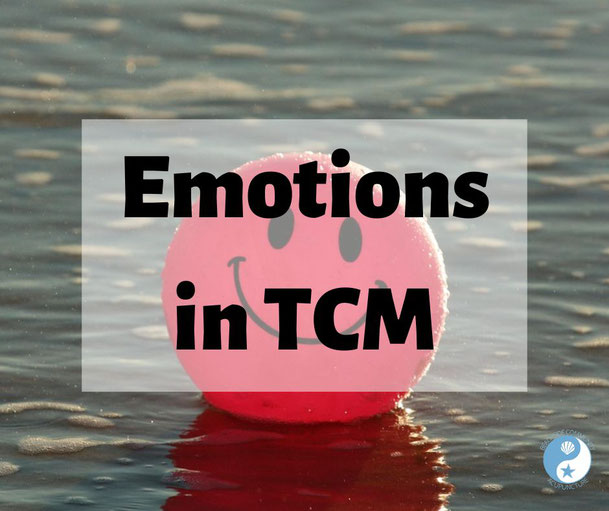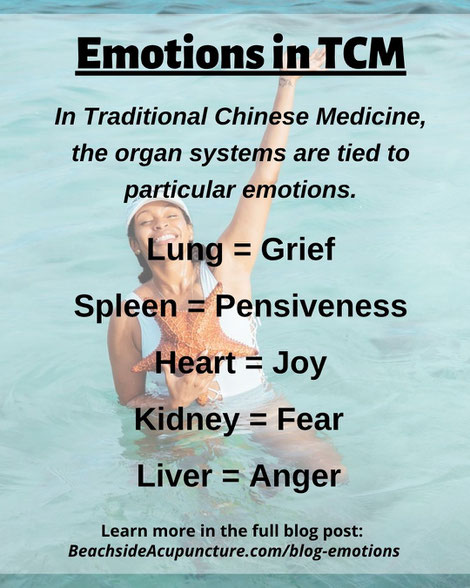
This post contains affiliate links, meaning Beachside Community Acupuncture PLLC may receive a small commission for purchases made through certain links at no additional cost to you. (In other words, you support us in a small way when you buy the products that we highly recommend and would use ourselves!) Click here to view our full disclosure policy.
Everything is connected in Traditional Chinese Medicine (TCM), and the body and mind can easily influence each other's states. In fact, TCM believes emotions are the most common cause of internal disharmony. Emotions are a normal part of life, but they can create imbalances when they're:
- Prolonged, like someone living in fear for years
- Unexpressed, such as someone bottling up anger instead of finding an appropriate way to vent it
- Sudden and overwhelming, as is the case for someone experiencing a great shock
Emotions can affect physical health in a variety of ways, and Traditional Chinese Medicine (TCM) theorizes that each emotion will have a predictable physical impact.
Emotions and Organ Systems
TCM looks at the organs differently, and each organ system has its own functions that may or may not overlap with Western medicine. One key difference between the two medical systems is the tie between emotions and they're corresponding organs.
Organ imbalances can be a catch-22 because an overwhelming emotion can cause disharmony...but a disharmony will also produce the emotion as a symptom. For instance, a person who is stressed will almost always end up with Liver Qi Stagnation, and a symptom of Liver Qi Stagnation is the inability to handle stress well. Another common example is someone who has a weak Spleen because of poor diet choices, which leads to a tendency toward pensiveness, which further weakens the Spleen.
No matter which came first, working on overall emotional balance is the key to maintaining general wellness. Self-reflection and the recognition of dominant emotions can lead to insights about the state of the organ systems and guide a treatment plan.
Worry
Worry (or pensiveness) includes overthinking and ruminating thoughts. Mental fatigue like this weakens and "knots" the Spleen, leading to upsets in digestion and energy. A weak Spleen also tends to be dominated by excess Liver conditions - see the next section! - and a vicious cycle can start in which a person feels both stressed and drained. Real-life examples of this are feeling queasy before a big presentation or having digestive upset during a time of stress.
Anger
Everything from irritation to stress to frustration to rage falls on the anger spectrum, and all of these emotions influence the Liver, causing stagnation like a traffic jam on a highway. Symptoms can range from frequent sighing (to let out the pent-up energy), discomfort in the rib cage, waking between 1 AM and 3 AM, and issues in other organs that are affected by the Liver, such as the digestive and respiratory systems.
Fear
Fear drains the Kidney system, and one of its jobs is to influence urination. When a character in a movie or show gets so scared that he wets his pants, this is the reason!
Grief
Sadness depletes the Lungs, such as when someone sobs to the point of not being able to catch a full breath. Prolonged, unexpressed grief can affect the immune system and cause a person to wake between 3 AM and 5 AM.
Joy
Extreme happiness affects the Heart, and while it may seem like someone could never get too much joy, TCM advocates balance in this emotion as well. The Heart "houses the mind" in TCM, and a person with excessive excitement or mania may experience palpitations or unclear thinking.

Staying Balanced
It's worth repeating: Emotions are completely normal! Feeling sad after ending a relationship shows how meaningful it was; feeling angry because of an injustice at work can lead to the institution of fairer practices. Experiencing emotions is arguably one of the best parts of being human, but they should be experienced, processed, and then let go. Holding onto grudges, letting negative thoughts spiral out of control, giving into irrational fears, and other aspects of imbalanced emotions can cause serious health issues if left unchecked.
Acupuncture and Chinese herbal formulas can help with emotional regulation, and calming practices like meditation, yoga, and Qigong work wonders as well. Of course, if even more support is needed, speaking with a therapist can aid in the processing of emotions, and therapy and acupuncture complement each other very well.
A Quick Word About Trauma
Traumatic experiences often lead to deeply rooted emotions that stay under the surface for years. Self-work such as journaling and forgiveness exercises can tap into the subconscious mind to dig up those roots, and acupuncture can assist with the processing of past trauma. Advanced types of therapy are almost always helpful, though, and patients with histories of abuse or trauma often do the best when they combine TCM treatments with modalities like eye movement desensitization and reprocessing (EMDR), hypnotherapy, or Internal Family Systems (IFS). The book The Body Keeps Score does a stellar job of describing the various ways that trauma impacts the body and gives an overview of these and other counseling options.
This post was originally published in October of 2017 and was updated in October of 2025.

Kathleen Ketola is a Licensed Acupuncturist and the owner of Beachside Community Acupuncture. She loves providing affordable acupuncture to the residents of McKinney, Texas, and surrounding cities like Prosper, Frisco, and Melissa, but she also enjoys educating the general public on how acupuncture and Traditional Chinese Medicine (TCM) can treat everything from pain to infertility to stress and beyond. Book online or contact her at (214) 417-2260 if you'd like to schedule an appointment.










Write a comment